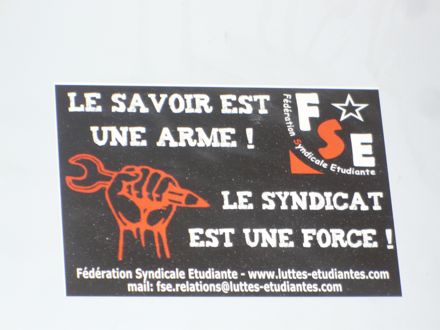It is an exaggeration to say that all Marxist theory people are men. But the historical masculinity of that little world — let’s face it —is hard to underestimate. I’m not talking about political Marxists here— though if we look at France, for instance, the Trotskyist Nathalie Artaud is essentially invisible compared to the Communist-backed Jean-Luc Mélenchon, though both are running for president.
Tag: marxism
Jeffrey Williams on academics’ class status
I decided today that it would be wise to quit Facebook and put more energy into this blog. If there’s anything I’ve learned in graduate school, it’s that it works wonders to channel one’s excess energy into something that’s not work but that nonetheless involves making something. Music. Writing. Cleaning the house.
Anyway, I’ve been working on an essay about precarious work in French universities, and I came across a passage that I think is a great starting point for any analysis of academics’ class status. It’s in an essay, “Smart,” by Jeffrey Williams, a literary critic; it’s one of the best essays about academic culture that I know. In this passage, Williams is trying to teach us that academics’ class status is ambiguous: definitely not working class in the traditional sense, but distanced, often, from the conventional markers of professional success.
Class is not just a question of what money you have or don’t have, nor solely a question of status conferred by cultural capital, but that it marks your body. If you look at most fellow academics’ hands, you’ll rarely see calluses.
I start with this… to broach both the visibility and invisibility of our class position. As academics, especially in the humanities, we have a vexed relation to class. On the one hand, by normal markers such as educational level (only about 10% of Americans have grad degrees, not to mention doctorates), the kind of work we do (white collar, with some autonomy, setting our own hours, etc.), salaries (which, while we might complain of how low they are, are much above the national mean, and certainly higher than, say, school teachers), as well as by tastes (what kind of magazines we have on our coffee tables—if you’ve ever tabulated the survey at the end of Paul Fussell’s Class), we are of the cultivated classes. Attaining our position through educational credentials, we are quintessential denizens of the professional-managerial class.
On the other hand, we often eschew or deny our class position, projecting a distance from the normal parameters of class in America. There are several ways that we do this: sometimes by projecting a kind of bohemian position on the peripheries of, if not antagonistic to, normative culture (we’re not like sharkskin suited lawyers, but wear jeans and open collars, and proclaim our queerity); sometimes by asserting a clerical position set against mainstream capitalism (we are not profit-seeking businesspeople, instead working in the non-quantifiable realm of culture, whether conservatively sanctifying its lineage or progressively opening it); sometimes by celebrating our uselessness (we fumble at basic tasks like filling out forms, because we reside in the higher realm of the mind); and sometimes by proclaiming our political resistance (as intellectuals, we stand outside capitalist society to criticize and resist it). Thus we are the class that somehow stands outside class.
Continue reading “Jeffrey Williams on academics’ class status”
Paris-Toulouse: Militant universities and the military parade on Bastille Day

Knowledge is a weapon! … The union is a force!
This is the continuation of my last post about the visual culture at the University of Toulouse (Mirail). Just having seen the 14 Juillet, i.e. Bastille Day, the national holiday in celebration of the 1789 French Revolution, it’s tempting to draw some comparisons with a rather different, far more legitimate kind of political landscape: that of the enormous military parade that took place Tuesday morning on the Champs-Elysées. Yes, I went, curious to see what exactly was involved in this enormous national pageant.
Continue reading “Paris-Toulouse: Militant universities and the military parade on Bastille Day”